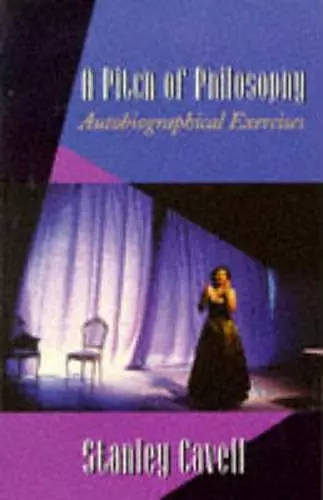A Pitch of Philosophy
Autobiographical Exercises
Format:Paperback
Publisher:Harvard University Press
Published:2nd Mar '96
Currently unavailable, and unfortunately no date known when it will be back

This is A Cavell's Progress. A reworking of his lifework themes intimating how the diverse parts, which might seem unconnected from the outside, are felt as of a piece. In philosophy, the discovery of Austin, the understanding of Wittgenstein, the raising of Emerson to the philosophical canon, the fascination with film, with images of women in a medium for women, the revelation that film and opera are the mediums of otherness for women. All this hung together with much intense family reminiscence, of Cavell choosing at sixteen his name, much about his mother the musician, about his father and the pawn shop. -- Ian Hacking, University of Toronto The result of Cavell's struggle to defend the Austinian heritage, in its 'democratic' defense of the ordinary, by restoring the distinctive voice and tone that he takes Derrida to neglect is to my knowledge the most suggestive discussion of the distinctive status of tone and voice in response to the two philosophical traditions epitomized, however ironically, by Derrida and Austin. -- Samuel Weber, UCLA
This book is an invitation to the life of philosophy in the United States, as Emerson once lived it and as Stanley Cavell now lives it—in all its topographical ambiguity.This book is an invitation to the life of philosophy in the United States, as Emerson once lived it and as Stanley Cavell now lives it—in all its topographical ambiguity. Cavell talks about his vocation in connection with what he calls voice—the tone of philosophy—and his right to take that tone, and to describe an anecdotal journey toward the discovery of his own voice.
The autobiographical note of Cavell’s philosophy, here as in his other writings, evokes an atmosphere of fragility and danger… Whether in the discussion of the haunting of Hamlet, or in the analysis of inheritance in the film Gaslight in which ‘something is resounding,’ or even in the reflections on the ‘necessarily forged’ signatures of ghosts, Cavell presents an understated but powerful analysis of a world and a self haunted by voices… Cavell’s work extends philosophy into other domains… His autobiographical exercises exemplify ‘humane criticism’ applied to philosophy, remaining true to the technical demands of the discipline and paying heed to the claims of the experience that sustains it. -- Howard Caygill * Times Higher Education Supplement *
Stanley Cavell is among the very few philosophers in America to have achieved a major reputation primarily through writing on the arts, and perhaps the only one to have evolved a prose style that has something of the character of artistic expression in its own right… The author’s voice kept—keeps—ringing in my inadequately pitched ear. -- Arthur C. Danto * ArtForum *
Cavell has carried on the tradition of Wittgenstein and John Austin into new areas of philosophy and literature… The present work is both an intellectual autobiography and a philosophy of the autobiography, in which he defends the authority of the personal voice. Of most philosophical interest is a long account, part actual, part possible, of an exchange between Austin and Derrida with Cavell’s own voice as adjudicator much in evidence. * Choice *
This is A Cavell’s Progress. A reworking of his lifework themes intimating how the diverse parts, which might seem unconnected from the outside, are felt as of a piece. In philosophy, the discovery of Austin, the understanding of Wittgenstein, the raising of Emerson to the philosophical canon, the fascination with film, with images of women in a medium for women, the revelation that film and opera are the mediums of otherness for women. All this hung together with much intense family reminiscence, of Cavell choosing at sixteen his name, much about his mother the musician, about his father and the pawn shop. -- Ian Hacking, University of Toronto
The result of Cavell’s struggle to defend the Austinian heritage, in its ‘democratic’ defense of the ordinary, by restoring the distinctive voice and tone that he takes Derrida to neglect is to my knowledge the most suggestive discussion of the distinctive status of tone and voice in response to the two philosophical traditions epitomized, however ironically, by Derrida and Austin. -- Samuel Weber, University of California, Los Angeles
ISBN: 9780674669819
Dimensions: 229mm x 152mm x 13mm
Weight: 259g
196 pages